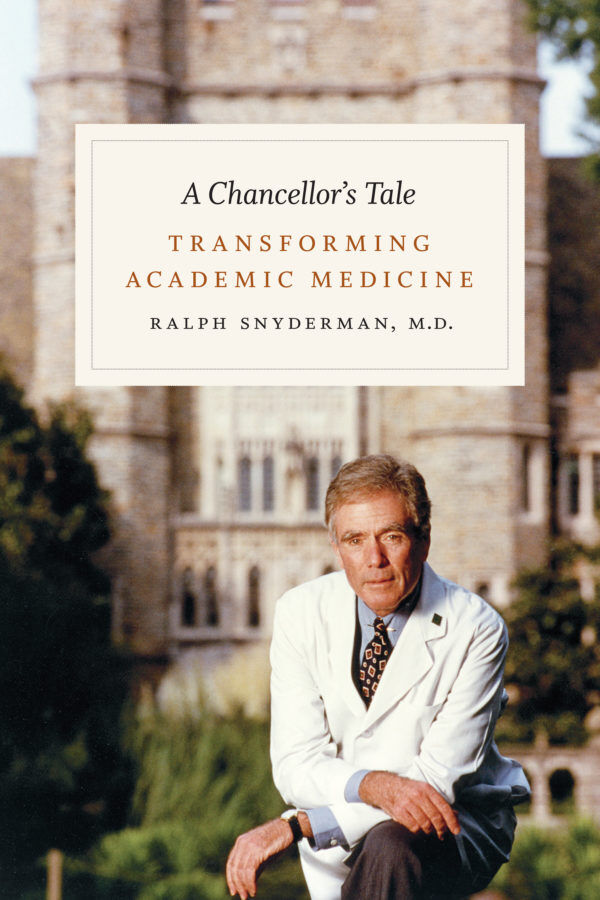During his fifteen years as chancellor, Dr. Ralph Snyderman helped create new paradigms for academic medicine while guiding the Duke University Medical Center through periods of great challenge and transformation. Under his leadership, the medical center became internationally known for its innovations in medicine, including the creation of the Duke University Health System—which became a model for integrated health care delivery—and the development of personalized health care based on a rational and compassionate model of care. In A Chancellor’s Tale Snyderman reflects on his role in developing and instituting these changes.
Beginning his faculty career at Duke in 1972, Dr. Snyderman made major contributions to inflammation research while leading the Division of Rheumatology and Immunology. When he became chancellor in 1989, he learned that Duke’s medical center required bold new capabilities to survive the advent of managed care and HMOs. The need to change spurred creativity, but it also generated strong resistance.
Among his many achievements, Dr. Snyderman led ambitious institutional growth in research and clinical care, broadened clinical research and collaborations between academics and industry, and spurred the fields of integrative and personalized medicine. Snyderman describes how he immersed himself in all aspects of Duke’s medical enterprise as evidenced by his exercise in “following the sheet” from the patient’s room to the laundry facilities and back, which allowed him to meet staff throughout the hospital. Upon discovering that temperatures in the laundry facilities were over 110 degrees he had air conditioning installed. He also implemented programs to help employees gain needed skills to advance. Snyderman discusses the necessity for strategic planning, fund-raising, and media relations and the relationship between the medical center and Duke University. He concludes with advice for current and future academic medical center administrators.
The fascinating story of Snyderman’s career shines a bright light on the importance of leadership, organization, planning, and innovation in a medical and academic environment while highlighting the systemic changes in academic medicine and American health care over the last half century. A Chancellor’s Tale will be required reading for those interested in academic medicine, health care, administrative and leadership positions, and the history of Duke University.
Dr. Snyderman joined the Alliance Board of Directors in 2012 and has served as a member of the sub-committee on Strategic Planning/Vision. In May of 2015 he was the keynote speaker at the inaugural Lasker Lessons in Leadership, a lecture series which is a collaborative effort between the Albert and Mary Lasker Foundation, the Alliance, and the NIH Oxford-Cambridge Scholars Program. Dr. Snyderman takes a personal interest in the research conducted by the scholars and has attended the annual Scientific Research Colloquium and spearheaded Mentoring Days for student in the NIH OxCam program. He is Chancellor Emeritus, Duke University, James B. Duke Professor of Medicine, and Director of the Center for Research in Personalized Health Care at the Duke University School of Medicine. He previously served as Chancellor for Health Affairs at Duke University and as the founding President and CEO of the Duke University Health System; Dean of the School of Medicine at Duke University; Chair of the Association of American Medical Colleges; Senior Vice President, Medical Research and Development, Genentech, Inc.; Director, Laboratory of Immune Effector Function, Howard Hughes Medical Institute; Chief, Division of Rheumatology and Immunology at Duke; and Senior Investigator, National Institutes of Health.
Dr. Snyderman has received numerous honors, including the Personalized Medicine World Conference Pioneer Award (2016), the North Carolina Life Sciences Leadership Award (2014), the Association of American Medical Colleges David E. Rogers Award (2012), the Industrial Research Institute Medalist Award (2008), the Ellis Island Medal of Honor (2003), and the CIBA-GEIGY Award for Lifetime Achievement in Inflammation Research (1992). He has authored almost 400 manuscripts and is the editor or co-editor of several books.

